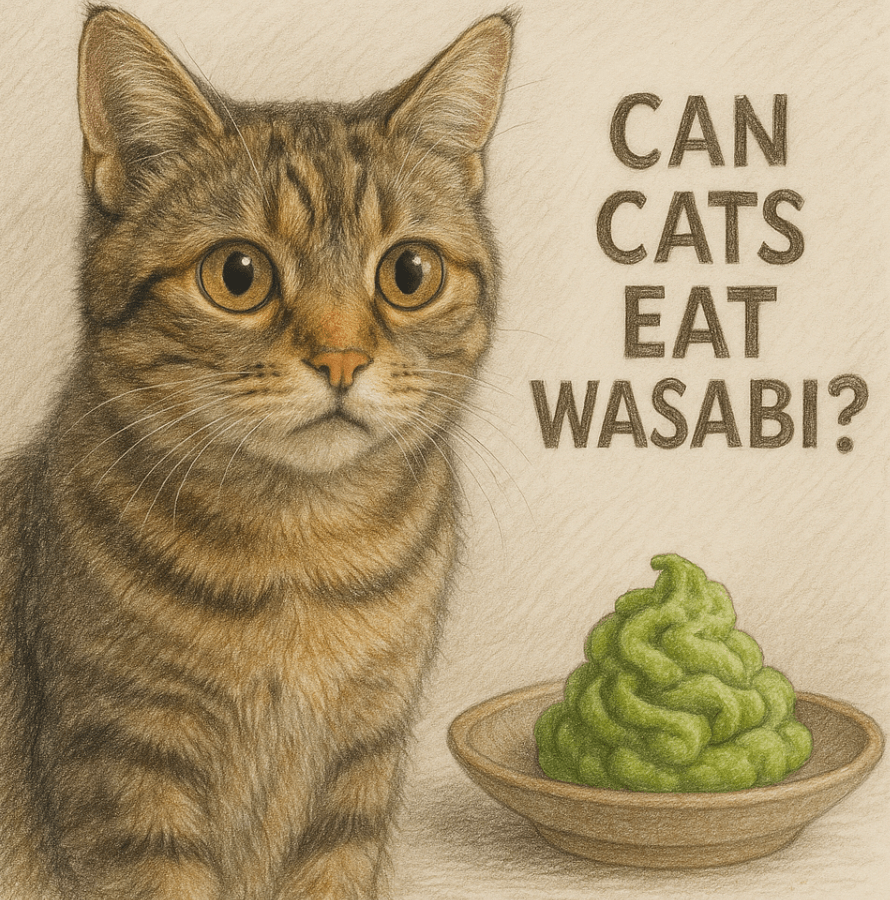Can Cats Eat Wasabi?
If you’ve ever wondered whether your curious feline can safely indulge in a taste of wasabi, you’re not alone. As cat owners, we often find ourselves questioning which human foods are safe to share with our pets. Wasabi, known for its fiery kick and vibrant green color, is a popular condiment in many cuisines—but does it belong anywhere near your cat’s food bowl? While cats are obligate carnivores with specific dietary needs, their natural curiosity might lead them to investigate (or even taste) this spicy treat. In this blog post, we’ll explore the potential risks and benefits of feeding wasabi to cats, offering expert advice to help you make informed decisions about your pet’s diet.
Why Wasabi Is Not Safe for Cats
While wasabi might seem harmless in small amounts, it poses several risks to cats due to its strong flavor and chemical composition. Here are the main reasons why wasabi should be avoided in your cat’s diet.
Irritation to the Mouth and Throat:
The spiciness of wasabi can cause burning sensations in a cat’s sensitive mouth and throat, leading to discomfort or pain.Digestive Upset:
Consuming wasabi may irritate your cat’s stomach, resulting in vomiting, diarrhea, or nausea.Allergic Reactions:
Some cats may have allergic reactions to wasabi, including swelling, itching, or difficulty breathing.High Sodium Content:
Many commercially available wasabi products contain added salt, which can be harmful to cats if consumed in excess.Toxic Ingredients in Imitation Wasabi:
Most store-bought wasabi isn’t pure; it often contains horseradish, artificial colors, and preservatives that are unsafe for cats.
These risks highlight why wasabi is best kept far away from your feline friend’s reach.
What Happens If Your Cat Eats Wasabi?
Accidents happen, and if your cat accidentally ingests wasabi, it’s important to recognize the signs of distress and know how to respond. Here’s what to watch for and do if your cat consumes this spicy condiment.
Immediate Behavioral Changes:
Your cat may paw at their mouth, drool excessively, or appear agitated due to the burning sensation caused by wasabi.Vomiting or Diarrhea:
Gastrointestinal upset is a common reaction, as wasabi can irritate the lining of your cat’s stomach and intestines.Difficulty Breathing:
In severe cases, inhaling or swallowing wasabi particles may cause respiratory irritation or labored breathing.Lethargy or Weakness:
If your cat seems unusually tired or weak after eating wasabi, it could indicate poisoning or dehydration.Contact Your Veterinarian:
If your cat shows any concerning symptoms, seek veterinary care immediately to ensure their safety.
Prompt action and professional guidance are key to addressing accidental ingestion effectively.
Check this guide 👉Can Cats Eat Matcha? Best 7 Expert Tips!
Check this guide 👉Can Cats Eat Sauerkraut? Best 7 Expert Tips!
Check this guide 👉Can Cats Eat Curry? Best 7 Expert Tips!

Safe Alternatives to Wasabi | Risks of Feeding Human Foods to Cats |
|---|---|
Plain cooked chicken (no seasoning) | Toxic ingredients like garlic or onions |
Steamed vegetables (e.g., carrots) | Choking hazards from hard or sticky foods |
Bone broth (low-sodium, unseasoned) | Allergic reactions to unfamiliar foods |
Small pieces of plain fish (cooked) | Digestive issues from rich or fatty foods |
Cat-safe treats designed for felines | Obesity or nutritional imbalances |
How to Prevent Accidental Wasabi Consumption
Preventing your cat from accessing wasabi or other unsafe foods is essential for their well-being. Follow these tips to keep your furry friend safe.
Store Wasabi Out of Reach:
Keep wasabi and other condiments in sealed containers or high shelves where your cat cannot access them.Supervise During Meal Times:
Avoid leaving plates or bowls unattended, especially if they contain spicy or seasoned foods.Teach Boundaries Around Food:
Train your cat to stay away from countertops or dining areas using positive reinforcement techniques.Avoid Sharing Table Scraps:
Resist the temptation to feed your cat leftovers, as many human foods contain ingredients harmful to cats.Create a Cat-Friendly Snack Station:
Offer safe, cat-approved snacks nearby to distract them from your meals.
By taking these precautions, you can minimize the risk of accidental exposure to harmful foods like wasabi.
Signs Your Cat May Have Eaten Something Toxic
Cats are naturally curious and may sample things they shouldn’t. Recognizing the signs of toxicity can help you act quickly if your cat consumes something dangerous, such as wasabi.
Excessive Drooling:
Unusual drooling can indicate oral irritation or nausea caused by toxic substances.Pawing at the Face or Mouth:
This behavior suggests your cat is experiencing discomfort or pain in their mouth.Refusal to Eat or Drink:
A sudden loss of appetite may signal digestive upset or illness.Unusual Vocalizations:
Crying or meowing more than usual could mean your cat is in distress.Changes in Behavior:
Lethargy, aggression, or hiding are red flags that warrant immediate attention.
Being vigilant about these symptoms ensures timely intervention if your cat encounters something harmful.
Common Mistakes Cat Owners Make with Food
Even well-meaning cat owners can make mistakes when it comes to feeding their pets. Being aware of these pitfalls helps prevent accidents and promotes better feline health.
Assuming Human Foods Are Safe:
Many human foods, including wasabi, chocolate, and dairy, can harm cats despite being fine for humans.Overlooking Ingredient Labels:
Processed foods often contain hidden toxins like garlic powder or artificial sweeteners.Feeding Table Scraps Regularly:
Doing so can lead to obesity, nutritional deficiencies, or exposure to harmful ingredients.Ignoring Portion Sizes:
Even safe treats should be given in moderation to avoid upsetting your cat’s digestion.Not Consulting a Vet:
Always check with your veterinarian before introducing new foods into your cat’s diet.
Avoiding these mistakes ensures your cat stays healthy and happy.
Healthier Treat Options for Cats
Instead of risking your cat’s health with unsafe foods like wasabi, consider offering these vet-approved alternatives that provide nutrition and enjoyment.
Freeze-Dried Meat Snacks:
High-protein freeze-dried treats mimic the texture and taste of raw meat, satisfying your cat’s cravings.Cat Grass:
Safe plants like wheatgrass or oat grass offer fiber and aid digestion without posing any risks.Plain Cooked Fish:
Small amounts of cooked salmon or tuna (without seasoning) make excellent occasional treats.Homemade Cat Treats:
Simple recipes using ingredients like chicken, pumpkin, or liver allow you to control what goes into your cat’s snacks.Hydration-Focused Snacks:
Water-rich foods like cucumber slices or watermelon chunks (seedless) encourage hydration.
These healthier options cater to your cat’s instincts while keeping them safe.
Understanding Your Cat’s Dietary Needs
Cats have unique dietary requirements as obligate carnivores, meaning they rely on animal-based proteins for optimal health. Understanding their nutritional needs helps you make better choices for their diet.
High Protein Requirements:
Cats thrive on diets rich in animal proteins, which support muscle development and overall vitality.Low Carbohydrate Intake:
Unlike humans, cats don’t need large amounts of carbs and can struggle to digest them efficiently.Essential Fatty Acids:
Omega-3 and omega-6 fatty acids promote skin, coat, and joint health, often found in fish oils.Taurine Dependency:
Taurine, an amino acid found in meat, is critical for heart and vision health and cannot be synthesized by cats.Hydration Awareness:
Cats typically have low thirst drives, so incorporating wet food or water-rich snacks supports kidney function.
Meeting these dietary needs ensures your cat enjoys a balanced and nourishing diet tailored to their biology.
Frequently Asked Questions About Cats and Wasabi
Can cats tolerate small amounts of wasabi?
No, even small amounts can irritate their mouths, throats, and digestive systems.
Is imitation wasabi safer than real wasabi?
No, imitation wasabi often contains additives and preservatives that are equally unsafe for cats.
What should I do if my cat licks wasabi off my plate?
Monitor for symptoms like drooling or vomiting, and contact your vet if you notice any signs of distress.
Are there any spices that are safe for cats?
Generally, cats don’t benefit from spices, but tiny amounts of plain herbs like parsley or basil may be harmless.
How can I tell if my cat has an allergy to wasabi?
Look for signs like swelling, itching, or difficulty breathing, and consult your veterinarian immediately.
Keeping Your Cat Safe from Harmful Foods
While wasabi might add excitement to our meals, it has no place in your cat’s diet. Understanding the risks associated with feeding wasabi—or any human food—to your feline companion is crucial for their health and happiness. By providing safe alternatives, preventing accidental exposure, and staying informed about toxic foods, you can ensure your cat remains healthy and content. Remember, when in doubt, always prioritize your pet’s well-being over curiosity or convenience. With a little care and attention, you can enjoy your favorite foods while keeping your furry friend safe and sound.
Can a Cat Be Tested for Rabies? Best 7 Expert Tips! – Learn if testing is possible, understand the process, and discover prevention tips to keep your cat safe from rabies.
Can a Dog Be Tested for Rabies? Best 7 Expert Tips! – Learn how rabies testing works, why it’s critical, and what every dog owner needs to know.
Best Vegetables for Cat Food: Best 7 Expert Tips! – Discover safe, nutritious veggies to boost your cat’s diet, support digestion, and enhance overall health naturally.
Best Vegetables for Dog Food: Best 7 Expert Tips! – Discover safe, nutritious veggies to boost your dog’s diet, support digestion, and enhance overall health naturally.




